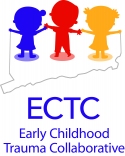Early Childhood Trauma Collaborative (ECTC)
IMPROVING CARE FOR YOUNG CHILDREN EXPERIENCING TRAUMA

Many children younger than seven years old have been exposed to trauma. If left untreated, it is associated with poorer lifelong outcomes including chronic health and mental health problems, impaired academic performance, and involvement with juvenile justice and adult criminal justice systems. Treatments for traumatic stress are very effective in helping children recover, but they are often geared towards older children.
The Early Childhood Trauma Collaborative (ECTC)
From 2016-2022, CHDI's Early Childhood Trauma Collaborative (ECTC) expanded trauma-focused treatments and services for children ages 0-7 in Connecticut. ECTC also helped Connecticut’s early childhood workforce identify and support young children and their families who may be experiencing traumatic stress.
Goals:
- Improve knowledge among Connecticut’s early childhood workforce about violence, abuse, and other forms of trauma, including how to identify young children and their families who may be experiencing traumatic stress
- Improve capacity to deliver community-based, trauma-focused services to children birth to age seven who are exposed to violence, abuse, and other forms of trauma
Partners:
- CHDI
- Connecticut Office of Early Childhood
- Connecticut Department of Children and Families
- The Consultation Center at Yale University (Evaluator)
- Evidence-based practice treatment developers and trainers
- Community-Based Providers:
- Bridges, A Community Support System
- Community Child Guidance Clinic, Inc.
- Child Guidance Center of Southern Connecticut
- Charlotte Hungerford Hospital, The Center for Youth & Families
- Community Health Resources
- Family and Children's Aid
- United Community & Family Services
- The Village for Families and Children
- Wellmore Behavioral Health
- Yale Child Study Center, Yale University
Activities:
- Train early childhood systems staff and service providers about childhood trauma, how to identify young children and families who may benefit from services, and how to make referrals for trauma-focused evidence-based interventions (2017-2021)
- Disseminate the Attachment, Regulation, and Competency (ARC) model in eight outpatient community agencies to serve children under seven years old (2017-2019)
- Disseminate the Child Parent Psychotherapy (CPP) model in four outpatient clinics in community-based agencies (2019-2021)
- Support sustainability and expansion of the Child and Family Traumatic Stress Intervention (CFTSI) model at 3 outpatient community agencies (2017-2021)
Results:
As a result of this six-year effort, families in Connecticut have improved access to three evidence-based treatments that are effective for young children, including:
- Child Parent Psychotherapy (CPP)
- Child and Family Traumatic Stress Intervention (CFTSI)
- Attachment, Self-Regulation, and Competency (ARC)
Data from those completing ARC showed that 64% experienced a reduction in child traumatic stress symptoms, 70% experienced reductions in problem severity, and 65% of caregivers experienced an improvement in their own symptoms of depression or traumatic stress.
Funding:
The ECTC initiative was funded through an initial 5-year, $2 million grant awarded to CHDI in 2016 from the Substance Abuse and Mental Health Services Administration (SAMHSA) as part of the National Child Traumatic Stress Network (NCTSN). CHDI received a one year no-cost extension through September 2022 to support providers to continue delivering services (most of whom experienced disruptions due to COVID-19). CHDI will continue to include the needs of young children in our ongoing EBT and outpatient work to ensure there are developmentally-appropriate, trauma-informed EBTs for children of all ages.
Learn more about our work to develop a robust system of trauma-informed care and services for children in Connecticut.



